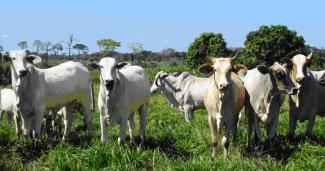Forest protection
Bonus for early movers
 KfW Group/Photographer: Karl-Heinz Stecher
Extensive grazing causes deforestation.
KfW Group/Photographer: Karl-Heinz Stecher
Extensive grazing causes deforestation.
The federal state of Acre is not one of Brazil’s best known areas. It is somewhat off the beaten track, in the west of the country, bordering Peru. Nonetheless, Acre now and again hits the headlines. In forest protection, for example, the federal state is one of the “pioneers”, says Karl-Heinz Stecher of KfW Development Bank “and not just in Brazil but also beyond”.
Even at the end of the 1980’s, Acre gained a sad notoriety for the murder of Chico Mendes, the forest conservationist. The rubber tapper and union leader got in the way of powerful interests in the cattle and lumber industries and paid for it with his life. His case attracted international attention at the time. But since then a lot has happened in Brazil’s most westerly state: Since 1998 the state government has constantly developed forest protection and new institutions, stricter laws and a comprehensive system for promoting environmental services (SISA – Sistema Estadual de Incentivos a Serviços Ambientais).
Above all, it has created alternative sources of income for small farmers and rubber tappers, and designated more areas as conservation zones. About half of the state’s rain forest is now under strict protection and the rate of deforestation has continuously fallen for some years. As Acre has made considerable efforts in relation to forest conservation, the state counts as an “early mover”.
KfW Development Bank now provides special assistance to such early movers on behalf of the German government. Since 2012, Acre has been receiving compensation for documented emission reductions, i.e. for unfelled forests. This innovative approach is being pursued in connection with REDD (Reducing Emissions from Deforestation and Forest Degradation) that is a result of the UN climate negotiations.
Accordingly the programme is named the “Global REDD Programme for Early Movers” (REM) and rewards early starters in forest protection. Its example should inspire other heavily forested areas to act. In order to prevent misuse the payment is made on the basis of emission reductions that have already been achieved that are calculated on the basis of a very conservative carbon analysis. In this way, climatically harmful CO2 emissions are to be reduced by 2015 by 13 million tonnes, including Acre’s own contribution. At the same time, the basis of subsistence for many small farmers/forest farmers and biological diversity are maintained.
However the state government in Rio Branco cannot do whatever it likes with the money from the REDD programme; it has to channel it directly back into forest protection by reforesting felled areas or supporting the local farmers in finding alternative sources of income such as fish farming. “This is done according to clear criteria for distribution of benefits,” says Stecher, “so that the local population also benefits.” Thus in addition to the production of nut oil, there is a condom factory, for example, that buys natural rubber at subsidised prices. Sources of income other than the sale of timber are important in the fight against illegal felling. Chico Mendes, who would probably have approved of this peaceful use of the forest, is not forgotten in Acre. There is now a prize named after him. One of the persons honoured in his name is none other than Karl-Heinz Stecher. He received the prize in 2013 because he made “a decisive contribution to saving our tropical forests” according to the Brazilian presenter of the prize.
The German federal government would like in future to extend the successful REM programme to Ecuador, Colombia and Asian countries. Something that Chico Mendes would also have approved of.
Friederike Bauer

